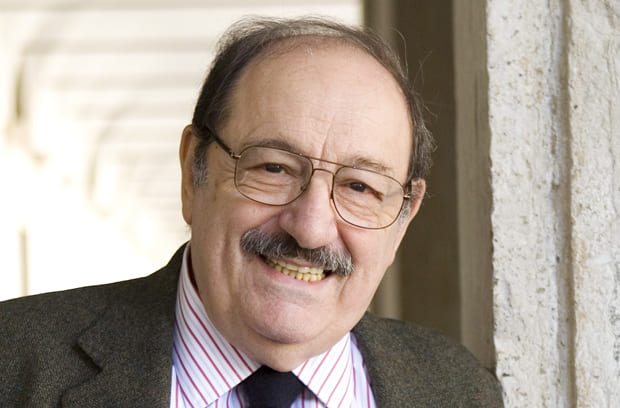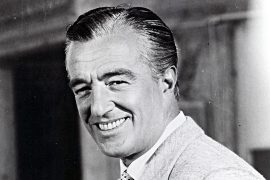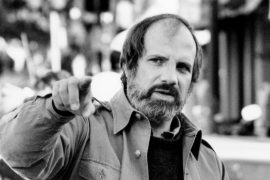The Italian writer and media scientist Umberto Eco was born 90 years ago. He led a successful life that didn’t just consist of books.
There is a nice story about the Italian writer Umberto Eco. When a journalist once visited him in his private library, he asked him: “And these books have you read all?”. Eco is reported to have replied, “No, those are the books I’m reading right now.” Then Eco led his guest into another library room and said, “And these are the books I’ve already read.” Reading was an elixir of life for Umberto Eco. It not only provided him with education, but also with humor. His probably most famous novel “The Name of the Rose” shows both.
Umberto Eco: An Italian all-rounder
“Luckily, I have a split personality,” is how Umberto Eco once described himself, explaining how he was able to be so extraordinarily productive in just one lifetime. When he presented his debut novel “The Name of the Rose” in 1980 at the age of 52, he had long been recognized worldwide as a philosopher and media scientist. Books like “The Open Work of Art” and the “Introduction to Semiotics” made him the “Lord of Signs” in the 1960s. In between, he works for television for a few years and tries to set up a cultural program. Then he is a non-fiction editor until he is appointed to the University of Bologna, which he is still a professor emeritus until his death in 2016.
The publisher and long-time companion Inge Feltrinelli once visited him there: “It’s wonderful to see him with his students in Bologna. He invited me to a conference on book publishing,” reports Feltrinelli. “And he sat down in the front row. And he’s really happy there. You can tell he’s just a great teacher. And he’s actually the way he’s always been. A little fatter, drinks a little less, but basically it is he’s the same Umberto Eco I’ve known for 40 years.”
“The Name of the Rose” remains Eco’s biggest hit
“It was a clear late autumn morning towards the end of November. During the night it had snowed a little, and so a fresh white veil, scarcely more than two fingers high, covered the ground”: Thus begins the first chapter of “The Name of the Rose ” in the German translation. The book has sold millions of copies worldwide in numerous translations and was ultimately made into a successful film. The scientist Eco becomes a best-selling author.
He has six more novels to follow – such as “The Foucault Pendulum” and “The Cemetery in Prague”, but none can build on the success of the debut. Umberto Eco said: “If I had to save a single novel that I have written, I would save Foucault’s Pendulum and not The Name of the Rose”. One should not succeed with the first novel, but with the last one If you succeed with the first novel, then you’re doomed.”
A mixture of pop star, professor and Goethe
Eco also mastered the art of exaggeration, because he was certainly not lost. His political commitment against Silvio Berlusconi’s policies was evident in numerous newspaper articles and interviews. For all his joie de vivre and humor, he was also a skeptical realist: “We live in a society in which everything flows, in which the idea of the state, the idea of parties, is dissolving. There is no longer any orientation. People don’t know what with they should identify themselves. We are Selfie. We only identify with ourselves anymore,” said Eco.
At a reading in Hamburg, the cultural scientist Lucia Braun once introduced him like this, without being able to guess what Umberto Eco would add at the end: “On the one hand, he is Italy’s moral conscience, the intellectual who gets involved. He is the polymath, the professor, the scientist, the researcher. He is the best-selling author who, so to speak, brought together the masses and the elite, the people and the writers. And he is the entertainer and as popular as a pop star. If you wanted to transfer it to German conditions, you could say: He’s a mixture of Günter Grass, Friedrich Kittler, Johannes Mario Simmel and Harald Schmidt. He’s all in one person.” Eco added: “And Goethe.”
What was Umberto Eco known for?
Umberto Eco, (born January 5, 1932, Alessandria, Italy—died February 19, 2016, Milan), Italian literary critic, novelist, and semiotician (student of signs and symbols) best known for his novel Il nome della rosa (1980; The Name of the Rose).
Is Umberto Eco religious?
Born in Alssandria in 1932, Eco was educated by the Salesians of Don Bosco, a Catholic order that stretches back to the 19th century. Eco later abandoned his religion; a header on his website reads, “When men stop believing in God, it isn’t that they then believe in nothing: they believe in everything.”
How old is Umberto Eco?
84 years
When did Umberto Eco start writing?
Eco began his career as a scholar of medieval studies and semiotics. Then, in 1980, at the age of forty-eight, he published a novel, The Name of the Rose. It became an international publishing sensation, selling more than ten million copies. The professor metamorphosed into a literary star.





